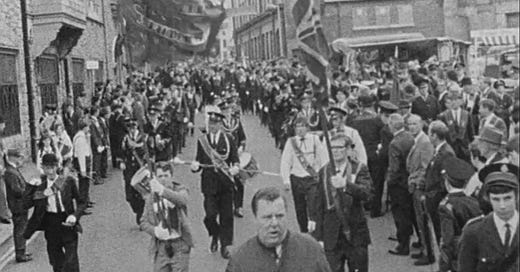A historic event happened in July 1969 when the Apollo 11 lunar module carrying Neil Armstrong and Buzz Aldrin landed on the surface of the Moon. Naturally, this made the headlines all over the world, however, back in Northern Ireland, there was more trouble to report on…
At the beginning of July, the County Inspector of the RUC at the time, David Johnston, wrote to the Ministry of Home Affairs on behalf of the Inspector General. The letter was in reply to a request for an assessment of the civil rights movement in Northern Ireland. The response is quite detailed, outlining the complex nature of the movement including all parties involved. For a comprehensive look at the response, you can read it in full here.
The 12th of July is the marching season for Ulster Protestants in Northern Ireland. It began in the late 18th century and celebrates the Glorious Revolution of 1688 and the victory of Protestant King William of Orange over Catholic King James II at the Battle of the Boyne of 1690, which ensured a Protestant Ascendancy in Ireland.
As the 'marching season' reached its height there was serious rioting in Derry and Dungiven.
In Dungiven, supporters of the Civil Rights Movement staged a sit-down protest to obstruct an Orange procession on Saturday the 12th of July. Stones were thrown after the police had tried to move them on. Later that day stones were also thrown at an Orange Hall, but the trouble was dispersed after the intervention of the parish priest.
However, later that evening, and on Sunday evening (13th), the Orange Hall was attacked with petrol bombs, and it was at this stage that police reinforcements arrived from Derry/Londonderry, including some members of the Special Constabulary.
It was on the 13th that Francis ‘Pól Beag’ McCloskey was caught up in an RUC baton charge. The 66-year-old retired farmer, who lived with his unmarried sister on the outskirts of the mountain town, was found unconscious near the Dungiven Orange Hall following a police baton charge against a crowd who had been throwing stones at the hall. Witnesses later said they had seen police batoning a figure in the doorway where McCloskey was found, although police claimed he had been unconscious before the baton charge and may have been hit with a stone. He was taken to hospital, where he died the next day. A later inquest found he suffered a brain haemorrhage as a result of a blow to the head. There are people who believe that Mr McCloskey was the first fatality of The Troubles.
On the 15th of July, in the aftermath of Mr McCloskey’s death, during a meeting of the Cabinet Security Committee at Stormont Castle, the Prime Minister considered issuing a statement to the press as he felt that the death could be taken as justification for attacks on the police. However, the Minister of Home Affairs warned that the issue of a statement that time could give rise to certain legal complications Following discussions, it was agreed that the most that could be said would be that “investigations into the circumstances surrounding the death are continuing”.
There is great archived footage of an RTE news report on the incident available here.
Meanwhile, on the 12th in Derry, crowds gathered during the afternoon and stones were thrown at Orangemen as they returned from their service. The evening was comparatively quiet, even though there were large crowds on the streets. The violence started around midnight and continued through the night. Catholics from the Bogside area tried to enter Fountain Street in the Protestant area, with the police attempting to keep the two groups apart. The trouble contained stones being thrown, fires starting and petrol bombs being thrown.
Calm returned on Sunday (13th), but similar violence started again on Sunday afternoon, and again that evening. The police reported that during the night a party of seven officers were trapped by a hostile crowd in a cul-de-sac, and subsequently fired a single warning shot into the air to disperse the crowd. This was followed by a volley of warning shots into the air, to which the crowd dispersed, albeit slowly. Around the same time, the police reported that shots were fired at them in another area of Derry, where two men were taken to hospital with gunshot wounds.
Watch archived RTE footage of the riots here
The police reported that over that weekend, 38 people were injured on Saturday night, of which 16 were policemen. They also reported that 20 civilians were injured on Sunday, with four being taken to hospital, as well as 29 police officers being injured, with three being taken to hospital. Overall, 21 people were arrested on Saturday and 16 on Sunday.
Interestingly, in the police report, they state that the violence appeared to have arisen as a result of tension caused by the processions associated with Orange Day and that there is no evidence that any of the civil rights organisations were responsible. They also stated that the processions themselves passed without incident, with the exception of Dungiven, and that the violence was unequivocally denounced by the Derry Citizens’ Action Committee and by Catholic priests.
On the 13th of July, Ian Paisley addressed a crowd at Loughgall, County Antrim, and is reported to have said;
"I am anti-Roman Catholic, but God being my judge, I love the poor dupes who are ground down under that system."
Given the escalation of violence in Northern Ireland, on the 22nd of July, John Hume met with Lord Stonham at Home Office. During the meeting, Mr Hume had asked the Home Secretary to discuss a proposal that a United Nations Peace-Keeping Force should be sanctioned in Northern Ireland.





